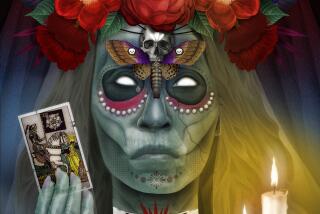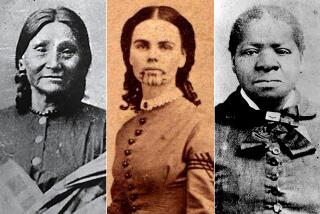The Sacred Hoop: RECOVERING THE FEMININE IN AMERICAN INDIAN TRADITION by Paula Gunn Allen (Beacon: $24.95; 311 pp.)
- Share via
“My great-grandmother told my mother: Never forget you are Indian. And my mother told me the same thing. This, then, is how I have gone about remembering, so that my children will remember too.”
In her most recent work, a collection of 17 essays representing more than a decade of cultural research, Native American author and scholar Paula Gunn Allen challenges five centuries of misconceptions surrounding the role of Native American women in many “pre-contact” tribal societies; misconceptions the author contends have “ . . . transformed and obscured what were once woman-centered cultures. . . .”
In her first section, “The Ways of Our Grandmothers,” Allen explores the relationship between female creation deities and their teachings and the pre-eminent status of women as creators and teachers of the rituals and laws that defined tribal consciousness, and the significance of mother and grandmother in Native American culture.
Allen also probes the effects of “colonization” by Western society and suggests that the degradation of female tribal status, indeed, the dehumanization of native people as a whole in American history, was not coincidental but imperative to the dissolution of tribal unity and identity. That “ . . . fragile web of identity . . . has gradually been weakened and torn. But the oral tradition . . . has prevented the complete destruction of the web . . . it heals itself and the tribal web by adapting to the flow of the present while never relinquishing its connection to the past.”
Through “The Word Warriors,” Allen reveals the influence of the oral tradition on contemporary Native American literature including selection from the works of N. Scott Momaday, James Welch, Leslie Marmon Silko, and other novelists and poets. A particular essay, “The Wilderness in My Blood: Spiritual Foundations of the Poetry of Five American Indian Women,” expresses with stunning clarity the conflict between a culture that professes a universal sense of belonging and “enwholement,” often symbolized by the sacred circle or, as Allen has entitled her work, the sacred hoop, and more recent Indian history in which a profound sense of alienation and loss are the common experience.
Six final essays examine the lives of Native American women in “a contemporary setting” covering a broad range of topics, including traditions, politics, lesbianism in tribal culture, tribal women’s social status and the emergence of feminism in America, and the struggle for cultural and biological survival.
“Our number grows,” the author states, “ . . . our determination to define ourselves grows, and our consciousness of our situation, of the forces affecting it, and of the steps we can take to turn our situation around grows.”
Allen’s life experiences as a Ph.D. in the field of Native American studies and professor at the University of California, Berkeley, and more important, as a Laguna Pueblo/Sioux woman who believes that personal and cultural truth are inseparable and vital to survival, form the bias of this book. It is precisely this bias that gives “The Sacred Hoop” its power and insight as a commentary on the perceptions and priorities of contemporary Native American women and as a source of information for those who continue to seek more than sociological and bureaucratic definition.
More to Read
Sign up for our Book Club newsletter
Get the latest news, events and more from the Los Angeles Times Book Club, and help us get L.A. reading and talking.
You may occasionally receive promotional content from the Los Angeles Times.










